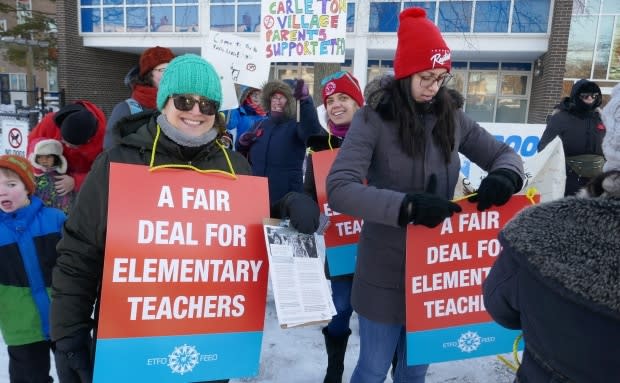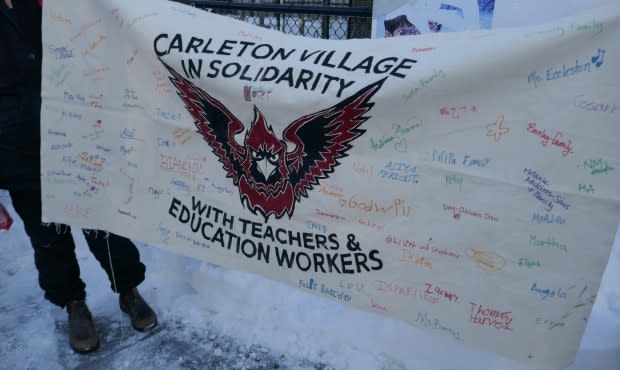Ontario education minister cites 'hardship on parents' as elementary teachers start strikes

Ontario's elementary teachers started a week of rotating one-day strikes today, shutting down schools in three boards.
The Elementary Teachers' Federation of Ontario (EFTO) is holding its first strikes today in the Toronto, York Region and Ottawa-Carleton school boards. Some 170,000 students in Toronto alone will be affected by the job action.
Teachers carrying signs gathered outside schools in the frigid weather in the morning, at times joined by parents and other community members. The strikes will hit different boards each day this week as tensions escalate between the union and the Progressive Conservative government.
This morning, ETFO president Sam Hammond said that the organization has had no "meaningful" progress in talks with the government since negotiations began in August. The two sides last met on Dec. 19, and new dates for continued discussions have been publicly released.
Full-day kindergarten, support for students with special education needs and hiring practices for occasional teachers have been particularly contentious issues between ETFO and the province, Hammond said, as well as a rate-of-inflation wage increase for teachers and education support workers.
Premier Doug Ford and Education Minister Stephen Lecce have said compensation is the primary sticking point. Last November, the PCs passed a bill that caps public sector yearly wage increases at one per cent for the next three years. Multiple unions have launched legal challenges to the legislation.
Ford said last week that he has no intention of reconsidering the wage increase limit.
Lecce said the strikes have "imposed hardship on parents in this province.
"We owe it to the students of this province to not withdraw services from them and ensure there is a continuum of learning," he told reporters Monday afternoon.
"I think kids are clearly paying the price because of the continuous, union-led escalation."
Watch how some Ontario families are preparing for a week of rotating teachers' strikes:
Speaking to CBC Radio's Metro Morning, Hammond said ETFO is willing to continue negotiations if the mediator sets new dates.
"We need to be at a table and we need to actually have a willing partner on the other side to negotiate. And there are still a number of issues on the table," he said.
Lecce has proposed hiring a private mediator, saying that a different approach could help break the gridlock between the two sides. Hammond has rejected the proposal. The current mediator was assigned by the Ministry of Labour.
"It's high time for us to consider that," he said Monday.
All four major teachers unions are engaged in job action as they negotiate new collective agreements with the government.
The Ontario Secondary School Teachers' Federation (OSSTF) is holding its seventh one-day walk-out at some boards on Tuesday, forcing exams in some schools to be rescheduled. The union says it will be its last one-day strike until the exam period is over.

Lecce told Metro Morning that the ministry has made "pretty substantive" policy concessions to assuage the OSSTF, including backing off a decision to increase the average high school class size and reducing the number of mandatory e-learning courses for high school students to two rather than four.
"We've made some moves, and it requires an element of reciprocity from the teachers unions to do the same," he said.
When asked if the government would legislate teachers back to work in the case of a full strike, Lecce said his focus right now is on securing deals with each of the unions.

Members of the Ontario English Catholic Teachers' Association will also strike for a day on Tuesday.
Only the union representing teachers in Ontario's French school system has contract talks scheduled with the government, even as they began a work-to-rule campaign last week.
Faced with ramped up action from the unions, the government announced last week that it would compensate parents affected by the elementary teacher strikes.
Under the plan, parents whose kids aren't yet enrolled in school but attend school-based child-care centres affected by the strikes will get the most money — $60 per day — while those with children in grades 1 through 7 will get the least — $25.
While parents of secondary school students won't get any funding, those with children with special needs up to age 21 will get $40 per day — the same amount as parents whose kids are in kindergarten.
Lecce said more than 120,000 parents have signed up for that program, which could cost the government $48 million per day if teachers from all school boards were to strike. That's less than the $60 million per day the government spends in teacher compensation, he added.

Corrigan Hammond, a father who walked a picket line with teachers at Carleton Village Junior and Senior Public School in Toronto, said the money will do little for his family amid the strike.
Hammond, who has no relation to the ETFO's Sam Hammond, told CBC News he took the day off work to care for his son and a friend.
"I'm not earning any money because I'm self-employed," he said, adding that more strikes in the Toronto public board would be a significant expense. But Hammond said he still wanted to show support for striking teachers.
"We think it's important to stand up for our teachers ... and we don't believe that the government is behaving in good faith."


